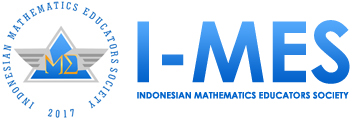Metakognisi Mahasiswa Dalam Menyelesaikan Masalah Pembuktian Matematis
DOI:
https://doi.org/10.35706/sjme.v8i2.10964Abstract
Metacognition is one aspect that supports individual success in solving mathematical proof problems because using metacognition when solving problems will produce effective results. This research aims to collect information about students' metacognition in solving mathematical proof problems. This research applies a qualitative
escriptive approach. There were 30 Mathematics Education students involved in this research from Universitas Negeri Malang. The way to obtain data in this research uses a mathematical proof test and
interviews. The results obtained from this research reveal that the metacognition experienced by students consists of awareness, regulation, and evaluation. However, the metacognitive activities of
the first student were different from other students. This is because each individual’s metacognition is different even though both have the same problem-solving abilities.
Downloads
References
Abdelrahman, R. M. (2020). Metacognitive awareness and academic motivation and their impact on academic achievement of Ajman University students. Heliyon, 6(9), e04192. https://doi.org/10.1016/j.heliyon.2020.e04192
Anggo, M., Salam, M., Suhar, & Santri, Y. (2014). Strategi Metakognisi untuk Meningkatkan Haisl Belajar Matematika Siswa. Jurnal Pendidikan Matematika, 5(1), 84–91.
Ayazgök, B., & Aslan, H. (2014). The Review of Academic Perception, Level of Metacognitive Awareness and Reflective Thinking Skills of Science and Mathematic University Students. Procedia - Social and Behavioral Sciences, 141, 781–790. https://doi.org/10.1016/j.sbspro.2014.05.137
Bieda, K. N., Ji, X., Drwencke, J., & Picard, A. (2014). Reasoning-and-proving opportunities in elementary mathematics textbooks. International Journal of Educational Research, 64, 71–80. https://doi.org/10.1016/j.ijer.2013.06.005
Desoete, A., & De Craene, B. (2019). Metacognition and mathematics education: an overview. ZDM - Mathematics Education, 51(4), 565–575. https://doi.org/10.1007/s11858-019-01060-w
Fatima, S. N., Munawwir, Z., & Kartika Sari, L. D. (2021). Analisis Kemampuan Metakognisi Siswa dalam Pemecahan Masalah Menggunakan Soal TIMSS ditinjau dari Perbedaan Gender. Jurnal Pendidikan Dan Kewirausahaan, 9(2), 349–366. https://doi.org/10.47668/pkwu.v9i2.227
Jacobse, A. E., & Harskamp, E. G. (2012). Towards efficient measurement of metacognition in mathematical problem solving. Metacognition and Learning, 7(2), 133–149. https://doi.org/10.1007/s11409-012-9088-x
Kartika, D. L. (2020). Aktivitas Metakognisi Mahasiswa dalam Pemecahan Masalah Program Linear (Studi Kasus Berdasarkan Perbedaan Gender). Square : Journal of Mathematics and Mathematics Education, 2(2), 119. https://doi.org/10.21580/square.2020.2.2.6481
Khairunnisa, R., & Setyaningsih, N. (2017). Analisis Metakognisi Siswa dalam Pemecahan Masalah Aritmatika Sosial Ditinjau dari Perbedaan Gender. Prosiding Seminar Nasional Matematika dan Pendidikan Matematika, KNPMP II, 465–474.
Khairunnisa, & Ramlah. (2021). Aktivitas Pemecahan Masalah Siswa dalam Mengerjakan Soal PISA ditinjau Berdasarkan Tahapan Polya. Jurnal Pembelajaran Matematika Inovatif, 4(2), 445–452. https://doi.org/10.22460/jpmi.v4i2.445-452
Kyriakides, L., Anthimou, M., & Panayiotou, A. (2020). Searching for the impact of teacher behavior on promoting students’ cognitive and metacognitive skills. Studies in Educational Evaluation, 64(September 2019), 100810. https://doi.org/10.1016/j.stueduc.2019.100810
Lew, K., & Zazkis, D. (2019). Undergraduate mathematics students’ at-home exploration of a prove-or-disprove task. Journal of Mathematical Behavior, 54(September). https://doi.org/10.1016/j.jmathb.2018.09.003
Magiera, M. T., & Zawojewski, J. S. (2011). Characterizations of social-based and self-based contexts associated with students’awareness, evaluation,and regulation of their thinking during small-group mathematical modeling. Journal for Research in Mathematics Education, 42(5), 486–520. https://doi.org/10.5951/jresematheduc.42.5.0486
Martin, G. (1989). Proof Frames of Preservice Elementary Teachers. Journal for Research in Mathematics Education, 20(1).
Masfingatin, T., Murtafiah, W., & Krisdiana, I. (2018). Prospective Student Teachers Of Mathematics Abilities In Problem Solving Geometry Theorem Proving. Jurnal Mercumatika : Jurnal Penelitian Matematika dan Pendidikan Matematika, 2(2), 41–50. https://doi.org/http://dx.doi.org/10.26486/jm.v2i2.272
Moleong, L. (2015). Metodologi Penelitian Kualitatif. PT Remaja Rosda Karya.
Polya, G. (1981). Mathematical Discovery: On Understanding, Learning and Teaching Problem Solving, (Combined Edition). John Willey & Sons, Inc.
Purnomo, D., Nusantara, T., & Rahardjo, S. (2016). The Characterization Of Mathematics Students ’ Metacognition Process In Solving Mathematical Problems. Proceeding of 3Rd International Conference on Research, 16(May), 16–17.
Reisoğlu, İ., Eryılmaz Toksoy, S., & Erenler, S. (2020). An analysis of the online information searching strategies and metacognitive skills exhibited by university students during argumentation activities. Library and Information Science Research, 42(3). https://doi.org/10.1016/j.lisr.2020.101019
Schneider, W., & Artelt, C. (2010). Metacognition and mathematics education. ZDM - International Journal on Mathematics Education, 42(2), 149–161. https://doi.org/10.1007/s11858-010-0240-2
Setyadi, D. (2018). Proses Metakognisi Mahasiswa dalam Memecahkan Masalah Matematika (Studi Kasus Pada Mahasiswa Pendidikan Matematika UKSW). Kreano, Jurnal Matematika Kreatif-Inovatif, 9(1), 93–99.
Sigalingging, J. J. A., Muksar, M., & Qohar, A. (2019). Proses Metakognitif Siswa Dalam Menyelesaikan Masalah High Order Thinking. Jurnal Pendidikan: Teori, Penelitian, dan Pengembangan, 4(12), 1643. https://doi.org/10.17977/jptpp.v4i12.13084
Subanji. (2013). Pembelajaran Matematika Kreatif dan Inovatif. UM Press.
Sugandi, A. I., Bernard, M., & Linda, L. (2021). Pendekatan Metakognitif Terhadap Kemampuan Penalaran Matematik Siswa Ditinjau Dari Habits Of Minds. SJME (Supremum Journal of Mathematics Education), 5(1), 72–84. https://doi.org/10.35706/sjme.v5i1.4510
Suryaningtyas, S., & Setyaningrum, W. (2020). Analisis kemampuan metakognitif siswa SMA kelas XI program IPA dalam pemecahan masalah matematika. Jurnal Riset Pendidikan Matematika, 7(1), 74–87. https://doi.org/10.21831/jrpm.v7i1.16049
Taufik, M., & Susanti, R. D. (2022). Representation Of Students’ Relational Understanding In Solving Evidence-Related Problems. SJME (Supremum Journal of Mathematics Education), 6(1), 15–23. https://doi.org/10.35706/sjme.v6i1.5715
Veenman, M. V. J., Van Hout-Wolters, B. H. A. M., & Afflerbach, P. (2006). Metacognition and learning: Conceptual and methodological considerations. Metacognition and Learning, 1(1), 3–14. https://doi.org/10.1007/s11409-006-6893-0
Weber, K. (2005). Problem-solving, proving, and learning: The relationship between problem-solving processes and learning opportunities in the activity of proof construction. Journal of Mathematical Behavior, 24(3–4), 351–360. https://doi.org/10.1016/j.jmathb.2005.09.005
Wilson, J., & Clarke, D. (2004). Towards the modelling of mathematical metacognition. Mathematics Education Research Journal, 16(2), 25–48. https://doi.org/10.1007/BF03217394
Downloads
Published
How to Cite
Issue
Section
License

This work is licensed under a Creative Commons Attribution-ShareAlike 4.0 International License.
Authors who publish with this journal agree to the following terms:
- Authors retain copyright and grant the journal right of first publication with the work simultaneously licensed under a Creative Commons Attribution License that allows others to share the work with an acknowledgment of the work's authorship and initial publication in this journal.
- Authors are able to enter into separate, additional contractual arrangements for the non-exclusive distribution of the journal's published version of the work (e.g., post it to an institutional repository or publish it in a book), with an acknowledgment of its initial publication in this journal.
- Authors are permitted and encouraged to post their work online (e.g., in institutional repositories or on their website) prior to and during the submission process, as it can lead to productive exchanges, as well as earlier and greater citation of published work (See The Effect of Open Access).










